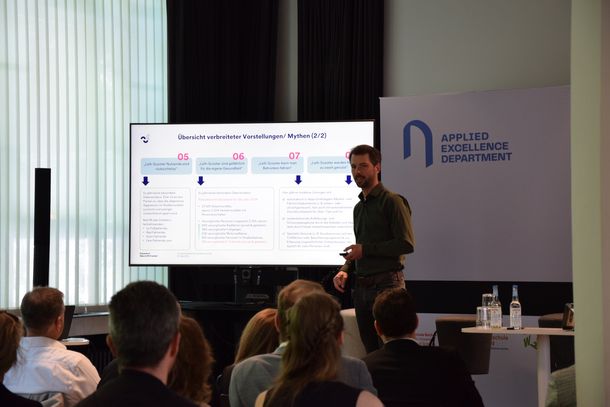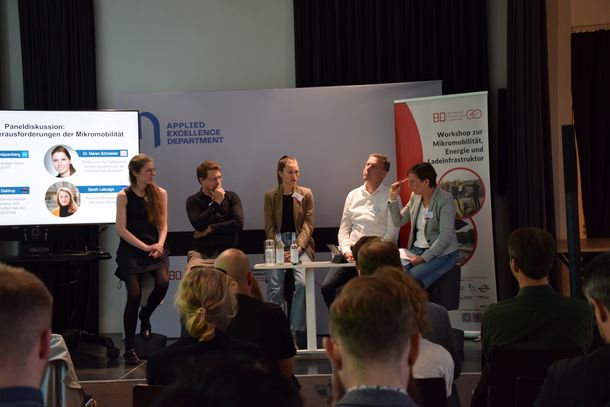Workshop on micromobility, energy and charging infrastructure in Herne
Review
On Friday, May 16, 2025, a workshop on micromobility, energy and charging infrastructure was held in Herne as part of the BMBF-funded research project “Smart City Sustainable Mobility II” (SCiSusMob II). In addition to presenting the key results of the research project, the aim of the event was also to gather perspectives and impetus from key players in the fields of mobility and energy.

The workshop began with a keynote speech by Dr. David Rüdiger. He gave an impressive presentation on how micromobility - in particular the use of e-scooters and other light electric vehicles - has developed in recent years and the challenges that still need to be solved. As Managing Director of Connected Mobility Düsseldorf, he presented an example of this and showed how a transition from the free-floating system - in which shared electric vehicles can be parked at will by users after being borrowed - to a system with mobility hubs and parking spaces for these vehicles on practically every street corner can be implemented.

In the panel discussion that followed, our moderator Katja Leistenschneider invited experts from the field of mobility to have their say. Together, Carsten Daldrup from Bogestra, Sarah Labusga from Nextbike, Johannes Knippenberg from Tier/Dott and Dr. Maren Schnieder from Bochum University of Applied Sciences discussed the opportunities and obstacles of micromobility in urban areas. One key aspect that was repeatedly emphasized was that the acceptance of citizens and municipalities for these alternative forms of mobility must be increased. In particular, cooperation with local authorities offers the opportunity to clarify the question of sufficient space for many mobility applications.
After a short break with delicious coffee and finger food, we moved on to the second part of the workshop, in which we presented key findings from the SCiSusMob II research project and reflected on them together with the participants.
Among other things, we presented how the real-world laboratory investigated in the project was structured, the hurdles we encountered, but also the positive insights we were able to gain from it. In particular, we discussed the advantages of dispensing with the milk run method - in which the batteries of the e-scooters and e-mopeds, or sometimes even the entire vehicles, are collected with vans and charged centrally in the depot - and using alternative charging methods when charging shared electric light vehicles.
We also talked about how a blockchain platform can be integrated into micromobility and how this can affect the safety and sustainability of this alternative form of mobility. The exact implementation of such a platform in our real-world laboratory was also discussed and demonstrated by Lukas Sturm from Green Power Brains.

The final part of the workshop consisted of a joint discussion with all participants on the creation of a joint business model for an energy and charging infrastructure for the various user groups - private users, sharing providers and logistics service providers - on which the research project focused. Thanks to the active participation, a business model canvas was filled with the most important aspects during the workshop, which can be used as the basis for further development of this business model with the Suncrafter project partners.
Following this discussion, ideas for new research projects were generated in smaller discussion groups.
We would like to thank Dr. David Rüdiger, Johannes Knippenberg, Carsten Daldrup, Sarah Labusga, Dr. Maren Schnieder, Lukas Sturm, Lisa Wendzich, and Katja Leistenschneider as well as all other participants for their inspiring contributions and their support in the implementation of the workshop.

